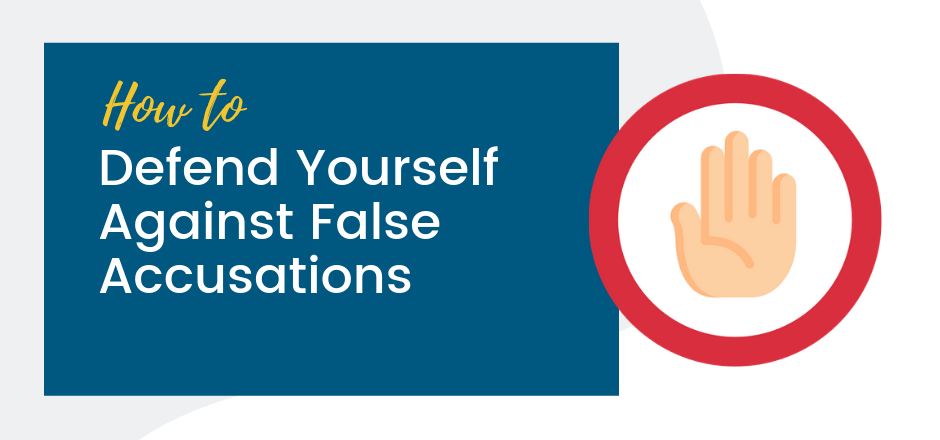How To Deny False Allegations
Have you been falsely accused of something you didn't do?
If so, it's important to understand how to defend yourself legally in order to avoid experiencing undeserved consequences. In this article, we're going to take a closer look at how to defend yourself against false accusations so you know how to handle the situation quickly.
So, how do you defend yourself against false accusations?

How to Defend Yourself Against False Accusations
No one likes to be falsely accused of anything. Whether you are facing criminal charges or a devastating lawsuit, you have the right to stand up for your innocence and fight the accusations in court.
The problem? Defending yourself from false accusations is rarely straightforward, and the emotional impact and hit to your reputation can be extremely high. We'll share a few tips to help you navigate this complex process in the article below.

What is a False Accusation?
A false accusation is an unsubstantiated claim or allegation of wrongdoing lacking evidence to support whether or not it's true.
False accusations are also known as unfounded accusations, groundless accusations, and false claims. Someone may be falsely accused of wrongdoing on purpose or by accident. Regardless, it's important to understand how to defend yourself against false accusations, as they can (and have) resulted in dire consequences for the person wrongly accused.
Types of False Accusations
False accusations are often divided into three different categories based on the nature of the accusation:
- Fabricated – an allegation that is entirely false
- Wrong perpetrator – an allegation based on a true event but blamed on the wrong person
- Mixed allegations – an allegation that combines truth and fabrications
Regardless of the type of false accusation, it's important that you understand how to defend yourself and handle the situation calm and collected. For the best results, consider contacting an attorney for guidance through the process.
Here's how to defend yourself against false accusations.
6 Ways to Defend Yourself
Depending on the specifics of the legal matter and accusation, you may want to consider exploring the various defense strategies.
For the best results, we recommend speaking with an experienced attorney before moving forward. This will ensure you select the best defense strategy sooner than later and avoid avoidable legal consequences.
Here are several ways to defend yourself against false accusations:
1. Manage Your Emotional Response
The first step in mounting a solid defense against false accusations is to manage your own emotional response to the situation. Knowing how to identify the types of emotions you may be feeling, and whether or not they are rational, can help.
People who have been accused of a crime they didn't commit often feel intense anger, anxiety, despair, negativity, or even a desperate sense of avoidance. It is also common to grapple with feelings of guilt even if you are entirely innocent.
These emotions are a natural product of being human; they don't make you wrong, bad, or somehow indicate your guilt. They can, however, make you overreact or lash out at the accuser and/or people who don't believe you in incredibly damaging ways.
Use coping skills, relaxation strategies, and community supports to help keep your emotions in check. Remember that you have a myriad of options available to help you defend yourself. You are not alone, and your life is not over – you just need to make a plan to address the accusations in the right way.
More importantly, remember that everything you say can be used against you in a court of law. It's far better, at least at this stage of the process, to say nothing at all, rather than reacting with emotion or oversharing info accidentally.
2. Comply With the Legal Process
Regardless of whether you are fully innocent, partially innocent, or even guilty, it is extremely important to be respectful of the legal process at all times. Get to know your rights, how the legal process should work, and what to expect. Comply with local law enforcement and justice workers to the very best of your ability during every interaction with them.
If you are arrested, don't fight it, and don't disrespect the officer for arresting you. Remain quiet and ask for a lawyer at the first opportunity. Familiarize yourself with this guide from the California State Bar in advance if possible.
If you are subpoenaed for court, attend – failing to show up is illegal. If you do refuse to go to court, either out of willful defiance or anxiety, the judge may release a bench warrant for your arrest; this can harm your case.
Any aggressive action toward the person that has accused you of wrongdoing – online, in person, or otherwise – may harm your case. If the accuser feels frightened, attacked, or harassed, you could find yourself on the receiving end of an order of protection or harassment charges.
Above all else, respect that it can take some time to reach a resolution. Many court cases take months or even years to clear the courts, but you will be granted the opportunity to defend yourself. Use the time to prep your defense.
3. Defend Yourself
America's justice system operates on the presumption of innocence until proven guilty. No matter what you are accused of, you always have the right to defend yourself in court. If false accusations harm your reputation or affect you financially (e.g., you lose your job), you may even have the right to sue the accuser for compensation to help you bounce back.
Of course, the right to defend yourself doesn't always mean you won't be convicted of a crime you didn't commit. How you argue your case in court, and what evidence you present, can significantly impact your chances of success.
If you are involved in a criminal court case, you have two main options for defending yourself during a trial:
- Defending yourself: You serve as your own attorney. This means you are directly responsible for interpreting the law, gathering evidence, submitting legal forms, and arguing your innocence at all points throughout the case.
- Working with an attorney: You hire a lawyer to defend yourself instead. This means the attorney uses their expertise to ensure the evidence is presented in an effective and compelling manner at every stage of your case.
Generally, it's better to work with an attorney than to represent yourself, especially if your case is complex. Defending yourself is rarely recommended unless you fully understand the law (e.g., you are an attorney yourself) or the evidence is overwhelmingly clear.
4. Civil Court
The Civil Court of California deals with all cases involving lawsuits rather than criminal charges. While you cannot be represented by an attorney if you are sued in small claims court, you can opt for representation at any other level. This should be your first action if it is available to you. If you win, you can even request to be compensated for any monies paid to your lawyer.
When someone sues you in civil court, you must file an answer and/or respond to the lawsuit. This must be handled by a certain deadline (generally around 30 days after you are served). Head to your local courthouse or clerk's office; they can provide you with the correct form for your case. You can also find these forms online, but you will need to be sure you know exactly which form to use.
Once you fill out your response, bring it to the clerk in person to file it. In most cases, you will be asked to pay a small filing fee. If you cannot afford to pay, or you are low-income, don't be afraid to express this to the clerk. There are options to have the fee waived partially or entirely if it will induce hardship.
Once confirmed as filed, it is up to you to serve the plaintiff with your response. It is never recommended that you handle this step on your own. Instead, ask or hire someone over the age of 18 who isn't involved with your case – your local courthouse or sheriff's office may provide such services.
5. Gather Evidence
Evidence is paramount in both civil and criminal court cases, especially when you are accused of being in the wrong. Spend the time before your day in court gathering and organizing as much evidence as you can:
- Speak with any witnesses and get their side of the story.
- Ask if witnesses would be willing to testify on your behalf.
- Collect pictures, video, and documents proving your innocence. Organize and present them in an easy-to-understand way before court.
- Identify character witnesses (people who believe in your character who are willing to testify that you are trustworthy and likely to be innocent). Ask them to testify on your behalf.
- Write out your own version of the story while it is fresh and you still remember it. This is critical if defending from criminal charges or claiming self-defense.
Remember that evidence need only corroborate your innocence; it doesn't necessarily need to directly prove your case. An airline ticket showing you were out of the country during a crime, for example, provides an excellent alibi because it proves you weren't present, and thus, couldn't have committed the crime.
6. Find an Attorney
No matter what level of a section of the court your case falls under, you should at least consult with an attorney once.
Both criminal and civil cases can be notoriously complex in the state of California. Being unaware of certain loopholes or multilayered legal requirements could inadvertently put you in a position where you put yourself and your case at risk.
Lawyers have the right expertise to help you navigate California's multilayered legal system with as little hardship as possible.
Find an attorney in Los Angeles
Frequently Asked Questions
What should you do if falsely accused of a crime?
Keep calm, gather evidence that proves the allegation is false, contact an attorney, and be cooperative during the whole process.
Should I confront the person who has accused me?
No. Interacting with your accuser may result in an emotional response, which can harm your case later.
Can I sue for being falsely accused?
Yes. If your accuser's statements to a third party harmed your reputation and caused damages, you may have a claim for defamation.
Conclusion
Now that you know how to defend yourself against false accusations, you will be able to handle such a situation quickly and efficiently. This is important, as ignoring the problem will only make it worse.
For the best results, follow the steps outlined in this article and let us know if you need help finding a lawyer.

How To Deny False Allegations
Source: https://sfvbareferral.com/how-to-defend-yourself-against-false-accusations/
Posted by: montalvohissionere.blogspot.com

0 Response to "How To Deny False Allegations"
Post a Comment